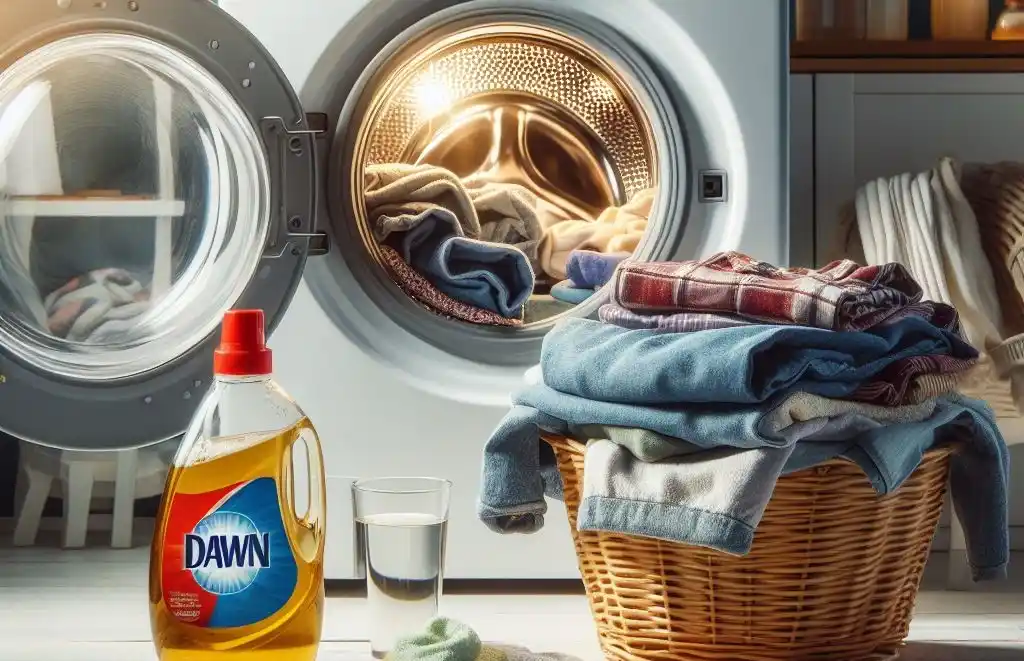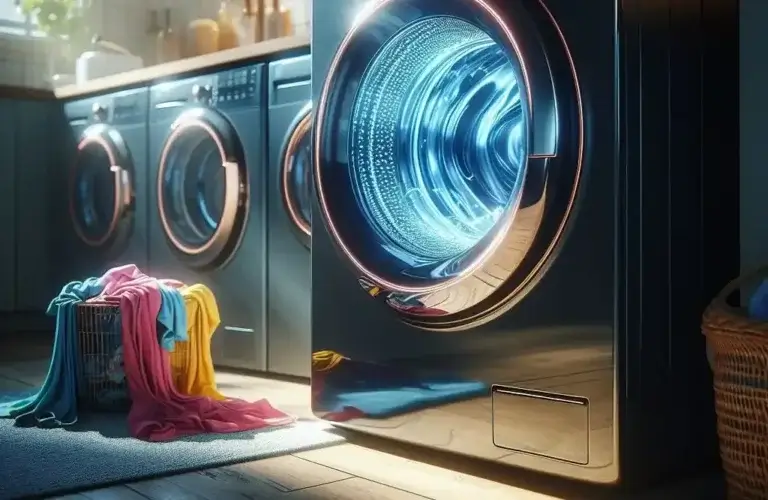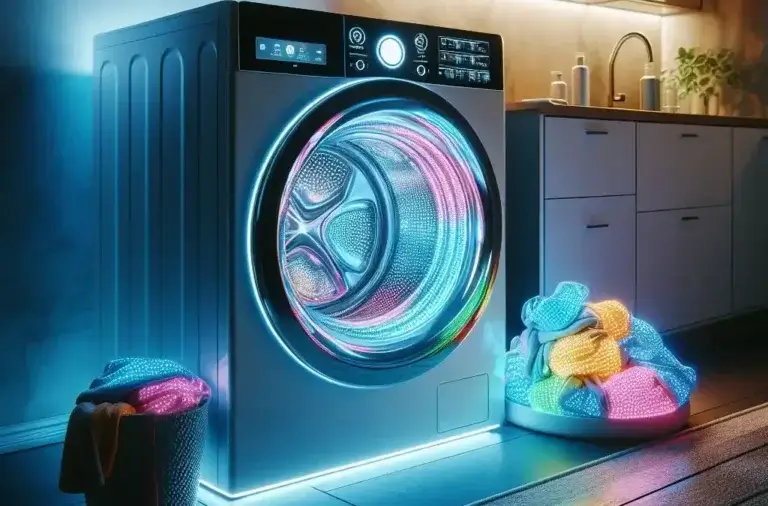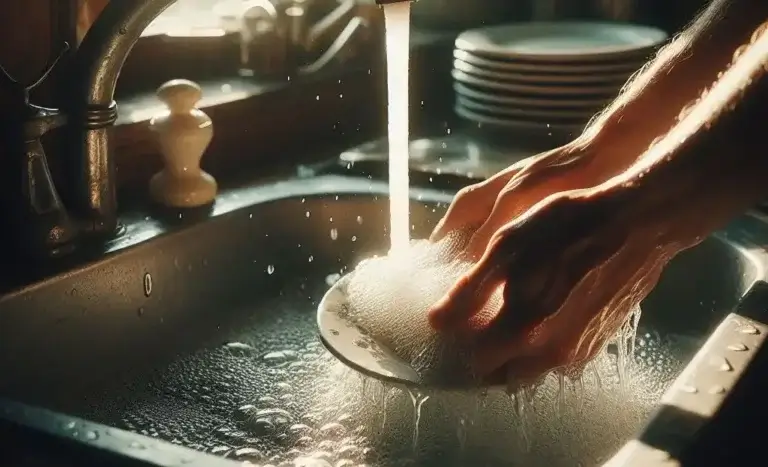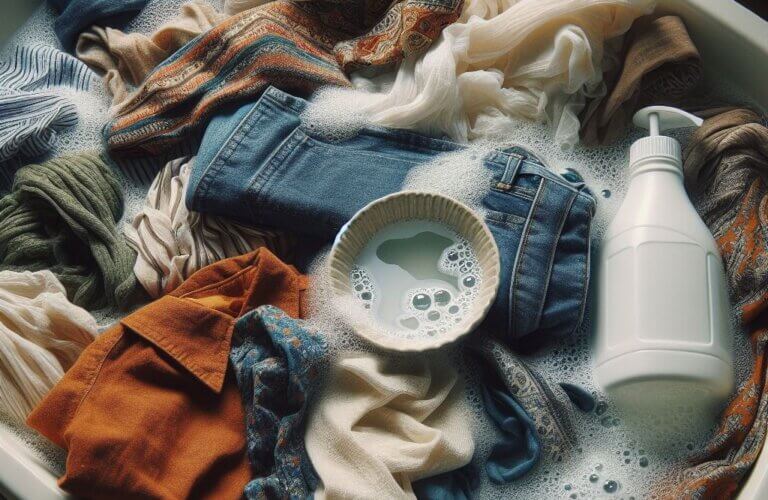Can You Use Dish Soap to Wash Clothes? The Pros, Cons, and Alternatives of Laundry Detergent
Have you ever wondered if can you use dish soap to wash clothes? With rising detergent prices, using a multipurpose soap seems economically smart. However, dish soap is not formulated the same as laundry detergent. So, what happens when you use dish soap in the washing machine?
Using dish soap to wash clothes can work in a pinch. However, there are some drawbacks to watch out for. Keep reading to learn the pros, cons, and alternatives to washing with dish soap.
Table of Contents
Should You Use Dish Soap to Wash Clothes?
Laundry detergent prices have skyrocketed, leading consumers to get creative with clothing wash solutions. For instance, some people use dish soap like Dawn Ultra in place of laundry detergent. Dish soap is formulated to cut through food grease. So it makes sense it could wash dirty clothes too, right?
While the cleaning power of dish soap is tempting, proceed with caution. Dish soap can cause problems for your washing machine, clothes, and skin. Compared to laundry detergents, dish soaps have different chemical formulas that impact washing performance.
Below we will explore:
- The pros of using dish soap to launder clothes
- The cons to be aware of
- Safe laundry detergent alternatives
By the end, you’ll know whether you should wash your clothes with dish soap. First, let’s look at why the idea is so appealing…
Why Use Dish Soap to Wash Clothes? – The Pros
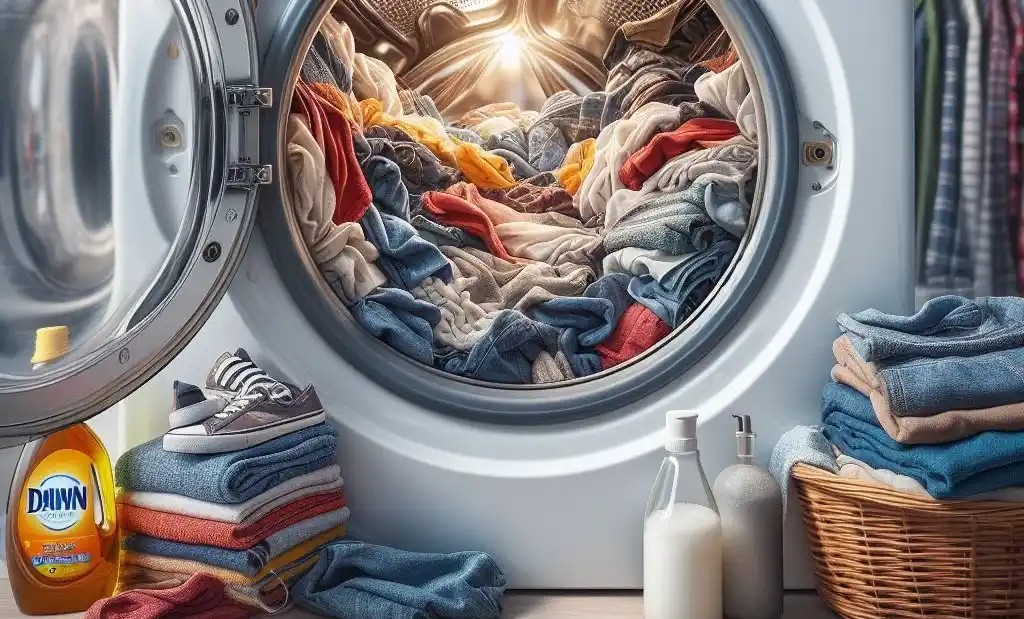
- Added cleaning ingredients – Dish soap contains extra grease-cutting surfactants to help wash away food oils and grime from dishes. These active cleaning agents could help remove some extra stains from laundry too.
- Suds up easily – One perk of dish soap is how sudsy it gets. Lots of bubbles must mean it will get your clothes extra clean, right? Well, not necessarily…
- It’s convenient to use one cleaner for everything – Instead of buying multiple cleaning products, using an all-purpose dish soap seems economically and environmentally smart.
- Some soils respond better to dish soap – While laundry detergents excel at removing most dirt, dish soap can sometimes be better at pretreatment for oil-based stains. The extra degreasing agents help eliminate greasy foods, makeup residue, motor oil, and more from fabric.
Those benefits make it understandable why people explore dish soap for DIY laundry hacks. However, just because dish soap can wash clothes in theory doesn’t mean it should. Laundry experts caution against regular use for several reasons. Keep reading to learn why washing clothes with dish soap is problematic before trying it at home.
Why You Shouldn’t Use Dish Soap to Wash Clothes – The Cons
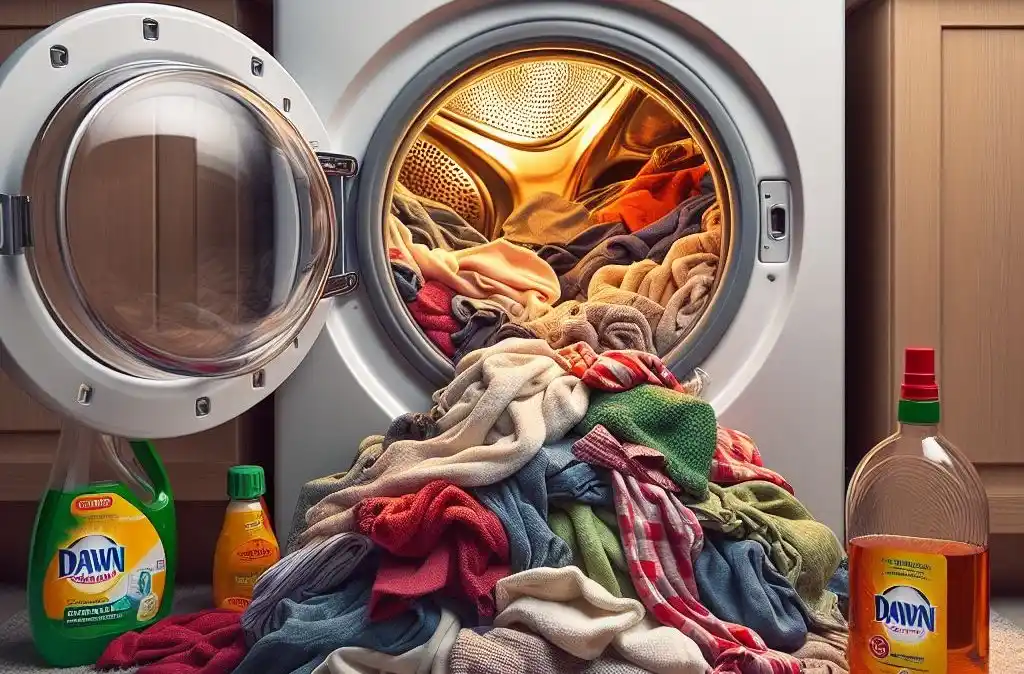
Dish soap might seem like a convenient cleaner for tackling laundry. However, using a soap not designed for washing machines frequently causes issues. Dishwashing liquid can damage clothes, machines, and skin when used improperly in the laundry.
1. Too Many Suds Cause Washing Machine Problems
One major issue with using dish soap in the washing machine is it creates way more suds than the appliance can handle. The extra foaming agents in formulas like Dawn are meant for hand-washing sinks – not washers.
Inside a running washing machine, mounds of bubbles quickly overflow. Excess suds spew out of interior tubs, backing up cycles. Cleaning solution leaks onto floors while pumps fail to drain properly. Machines essentially choke on all the thick foam.
While a rare load with dish soap won’t necessarily break your washer, repeated use can cause ongoing performance problems. Parts like pumps and tub seals wear down faster from overexposure to foamy formulas.
2. Harsh Detergents Can Damage Delicate Fabrics
Laundry detergents carefully balance cleaning power with fabric safety. Formulas are designed to keep clothes clean while keeping them intact. That is not the case when using dish soap instead.
Dish soap contains relatively harsh degreasing agents meant for scrubbing food grime off durable dishware. When applied directly in the wash, these active detergents strip delicate clothing fibers the same way.
Over time, regularly washing delicate fabrics like silk, lace, or wool in dish soap can cause permanent damage. Clothes become discolored, dingy, or develop holes from the harsh wash environment. Always check clothing labels before cleaning in alternative soaps.
3. Skin Irritations Can Develop Over Repeated Use
Dish soaps frequently rely on strong chemicals to remove tough grease and burnt-on food. While these extra degreasing ingredients are great for dishes, they can irritate sensitive skin.
When residue from the wash remains stuck in clothing, it stays in prolonged contact with your body. Prolonged exposure to harsh cleaning agents can cause changes to skin pH, chemical burns, rashes, and other problems in people with sensitivities. Babies and those with existing skin conditions especially react poorly.
For those reasons, laundry experts recommend against the regular use of alternative soaps. While using dish soap in an emergency wash might be OK, don’t make it your go-to laundry solution.
How to Safely Wash Clothes with Dish Soap If You Must
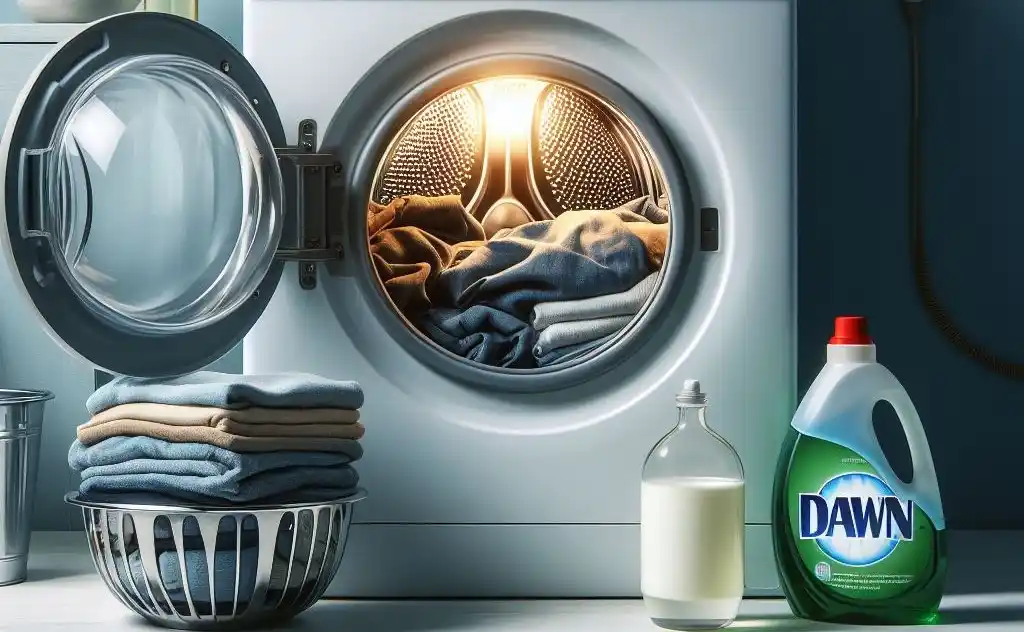
Sometimes an emergency stain situation calls for unorthodox cleaning methods. Say you discover an oil stain on your favorite shirt just before an important event. In a pinch, a bit of dish soap may make the garment presentable again fast.
While frequent use causes issues, a rare load with a small dash of dish soap likely won’t damage your machine. Here is how to wash clothes safely with dish soap if needed:
- Check clothing labels first – Scan care instructions to ensure items can withstand alternative washing. Skip dish soap for delicates prone to damage.
- Pretreat only severely soiled spots – Apply drops directly only on isolated stains instead of all over. This prevents overexposure.
- Use the smallest effective amount – For a whole wash load, a teaspoon or less of dish soap is plenty. Remember – it bubbles a lot!
- Run an extra rinse cycle – Be sure to finish with a thorough rinse to eliminate soap residue that can stick to fabric and skin.
With smart precautions, Dawn or other dish soaps may occasionally work for laundry in a pinch. But, what about options better suited for washing machines? Keep reading for the best laundry detergent alternatives…
Smart Laundry Detergent Alternatives to Dish Soap
While dish soap works for occasional emergency laundry, specialized detergents are still best for regular wash loads. Quality laundry products include surfactants and enzymes formulated to deep clean fabrics while protecting your washing machine.
Some smart alternatives to dish soap for washing clothes include:
- Laundry soap bars – Old-fashioned soap bars, like from Soap Nuts or other brands, effectively wash clothes without harsh chemicals.
- Borax – The sodium borate in Borax naturally boosts stain-fighting by chemically loosening dirt in water. Use a scoop in addition to your regular detergent.
- Baking soda – Similar to Borax, baking soda also acts as a mechanical cleaner that lifts stains via chemical reactions. Sprinkle some directly on stubborn spots before washing.
- Hydrogen peroxide – This common household chemical works like bleach to lift stains but is gentler on colors. Spritz over clothes as a prewash treatment.
- Kitchen degreaser – Tough grease is better removed by Goo Gone, Simple Green, or other degreasing formulas designed for home use. Check first for laundry safety.
Revisit your tried and true laundry detergent options before attempting risky DIY washer experiments. And if you must use dish soap in laundry, follow the safety guidelines above to avoid damaging consequences. With smart choices, you can effectively clean clothes without causing additional problems.
FAQs: Using Dish Soap to Wash Clothes
Can dish soap be substituted for laundry detergent?
It’s not recommended. While containing cleaning agents, dish soap causes excess sudsing that damages washing machines and clothes. Laundry detergents are specially formulated for compatibility and fabric safety during washing.
What if I already washed my clothes with dish soap by accident?
If you already washed a load in dish soap, run it through another rinse cycle before drying. This prevents excess soap residue from remaining stuck to fabrics. Then avoid further dish soap use except as a pretreatment on isolated stains in future emergency cases. Continued exposure risks damage.
What kind of laundry stains does dish soap remove best?
If used sparingly just on stained spots before washing, dish soap best targets oil and grease stains like lipstick, motor oil, sauces, makeup, etc. The extra degreasing agents provide a boost at lifting certain soaked-in spots laundry detergent alone may struggle with.
Can I mix dish soap with laundry detergent as a regular wash solution?
No. Combining the two products neutralizes cleaning agents in laundry detergent while the excess dish soap still causes overflowing bubble problems. Formula differences make them incompatible for simultaneous use. Stick to using laundry detergent alone for most washes.
Conclusion: Can You Use Dish Soap to Wash Clothes
While using dish soap on laundry seems like a convenient cleaning shortcut, take caution before swapping it for your regular detergent altogether. The degreasing formula for dishes causes issues like skin irritation, fabric damage, and machine malfunctions in clothes washing over time.
Laundry detergents carefully balance stain-fighting power with fabric protection that dish soaps lack. When in doubt, reference clothing care labels and opt for gentle detergents made specifically for washing machines. With smart choices, you can effectively clean clothes without causing additional problems.

